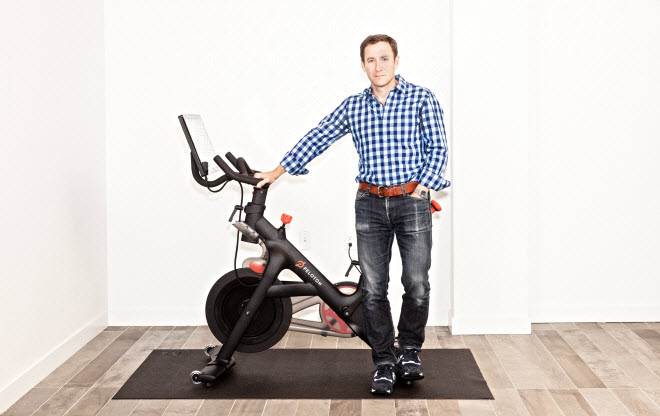
Exercise fanatics often talk about the “positive addiction,” the obsession they get from the endorphin rush of a great workout or fitness class. By these standards, fitness buff and Inspirato member John Foley and his wife were total addicts who needed a constant fix.
Their drug of choice: FlyWheel and SoulCycle. The problem: There are only a handful of these studios in New York City, and, as the parents of two young kids, rearranging lives to get to them in person could be tough. Foley remembers one particular stretch where his wife shelled out upward of $150 total for daycare and taxicabs to and from the class. “When we got to the point where it was costing us $150 and two hours for her to attend a 45-minute cycling class, we knew we had a problem,” he says. That’s when he had an epiphany: There simply had to be a better way.
The answer: Peloton Cycle, a new company launched last year that aims to revolutionize the way people around the world work out at home. Peloton specializes in high-end indoor spin bikes equipped with a 22-inch, sweatproof touchscreen tablet that streams spinning classes from Peloton’s TV studio for home workouts. Foley invented, researched and designed the bikes himself. The 43-year-old also serves as company CEO.
“The company—and our concept—are direct responses to the person who looks at his or her schedule and thinks, ‘It’s going to be tough to squeeze in a really tough and fulfilling workout,’” he said. “It’s possible to get a dripping-wet fitness class at any time, from any place. You just have to think about it a little differently.”
Foley has been thinking differently for the better part of a decade, focusing on e-commerce all the while. He is a former executive at Internet conglomerate, IAC; has helmed Proust.com, Pronto.com, and Evite.com; and has worked as general manager of notification and access at Ticketmaster. In his most recent job, he headed up e-commerce for Barnes & Noble, the bookseller that took on Amazon.com for supremacy in the e-book market (and, eventually, lost). Foley was in charge of the $500-million web division and tasked with shifting Barnes & Noble away from books and toward a broader marketplace model.
Though the company’s fit-in-your-knapsack NOOK hardware and software platform didn’t fall into his specific domain, the product and its implications always were front-of-mind. That means the strategic notion of swallowing profit margins to gain subscriptions was discussed every single day.
“That was the name of the game; getting the devices into consumer hands and selling them content after the fact,” he said, noting that infomercial-based fitness programs such as P90X use the same strategy, only without the technology. “We realized that people don’t take a Kindle Fire on vacation and think about the product itself, they’re thinking about the content—that book they’re going to read or movie they’re going to watch.”
This is the model Foley has embraced at Peloton, as well. Bikes retail for $2245—just about what Peloton pays to make them. The company’s business model will see its profits come from selling content; monthly subscriptions for the classes are required and rates start at $39 per month.
Peloton participants can opt to download archived classes at their own leisure, but much of the material is live—streamed from the company’s purpose-built New York City studio. Here, real-life participants sit atop bikes that encircle the class’ instructor (they’re called coaches at Peloton). The coach’s tablet on her bike enables her to see the names of all remote participants, affording her the chance to shout out specific names and words of encouragement during class.
Ultimately, under this new model, Foley has said coaches could become mini-celebrities, teaching up to 50,000 people at a time, and earning more than even the city’s highest-paying gyms would offer per class.
Coach Marion Berrian Roaman is the first piece of that plan. Once Foley had the prototype for the company, he recruited Roaman, who founded a popular spin studio in the New York City area, to become a co-founder and help run the show, and she jumped at the chance. For Roaman, the most important part is keeping participants engaged—regardless of whether they’re in the studio or streaming from St. Paul, Minnesota. She notes that Foley has encouraged her to experiment with camera angles as a way to maximize intimacy for participants at home.
“There’s a real bond you experience in a spin class as an instructor where you want people all over the room to feel like they’re right there with you, all going on this ride together,” she says. “Because [Foley] has taken spin classes, because he knows what it’s like to have those connections, he is supportive of constantly trying to make our content reflect this.”
After raising nearly $15 million to date, growth is next for Peloton. The company has opened several high-end retail stores to market the bikes in the New York City area and Los Angeles as well as through the website. And Foley claims that a number of high-end fitness centers and gyms across the country were working to incorporate the devices into classes at their respective facilities. He added that even a handful of Inspirato properties and luxury hotel chains were expecting to add machines by the end of the year.
Larry Silver, one of the investors in the business, summed up Foley’s strategy nicely: “What Ted Turner did for news with CNN, we think Peloton can do for fitness,” he told Crain’s Chicago Business last summer.
Foley agrees, noting that, eventually, he aims to stream as many as 12 hours of live content a day. “We could be like a TV network,” he says. “So long as people want the classes, there’s really no limit to the amount of content we can create.”



